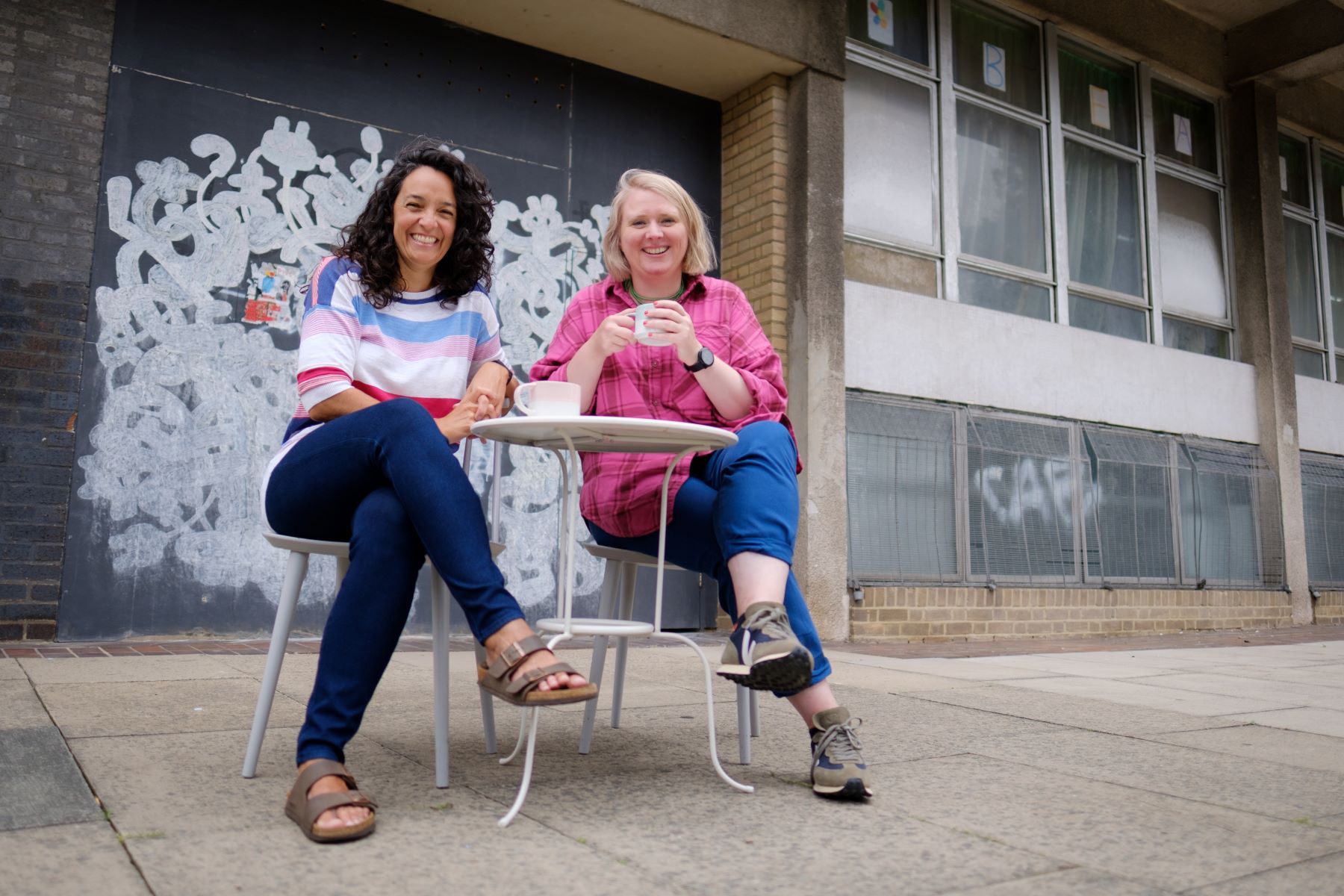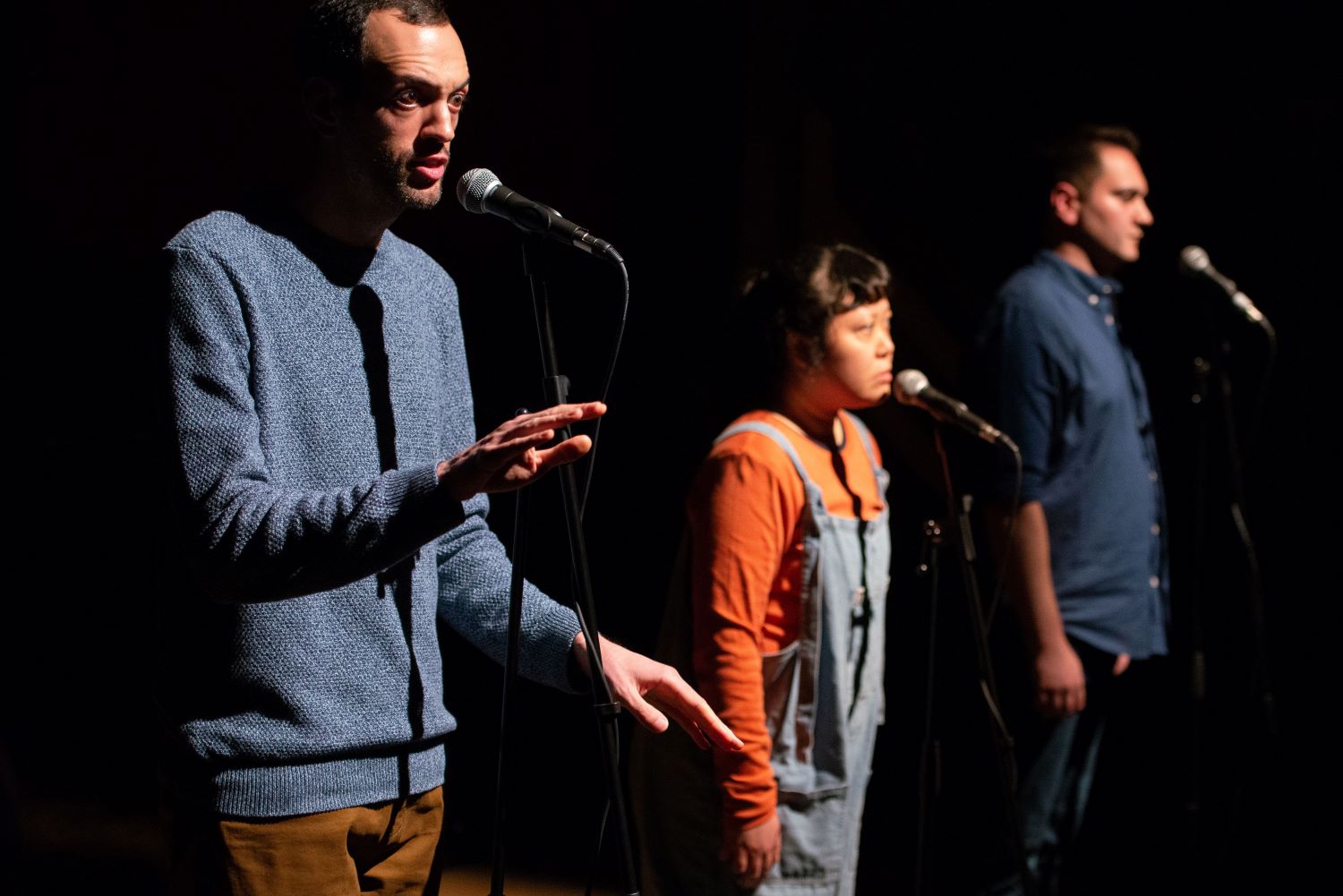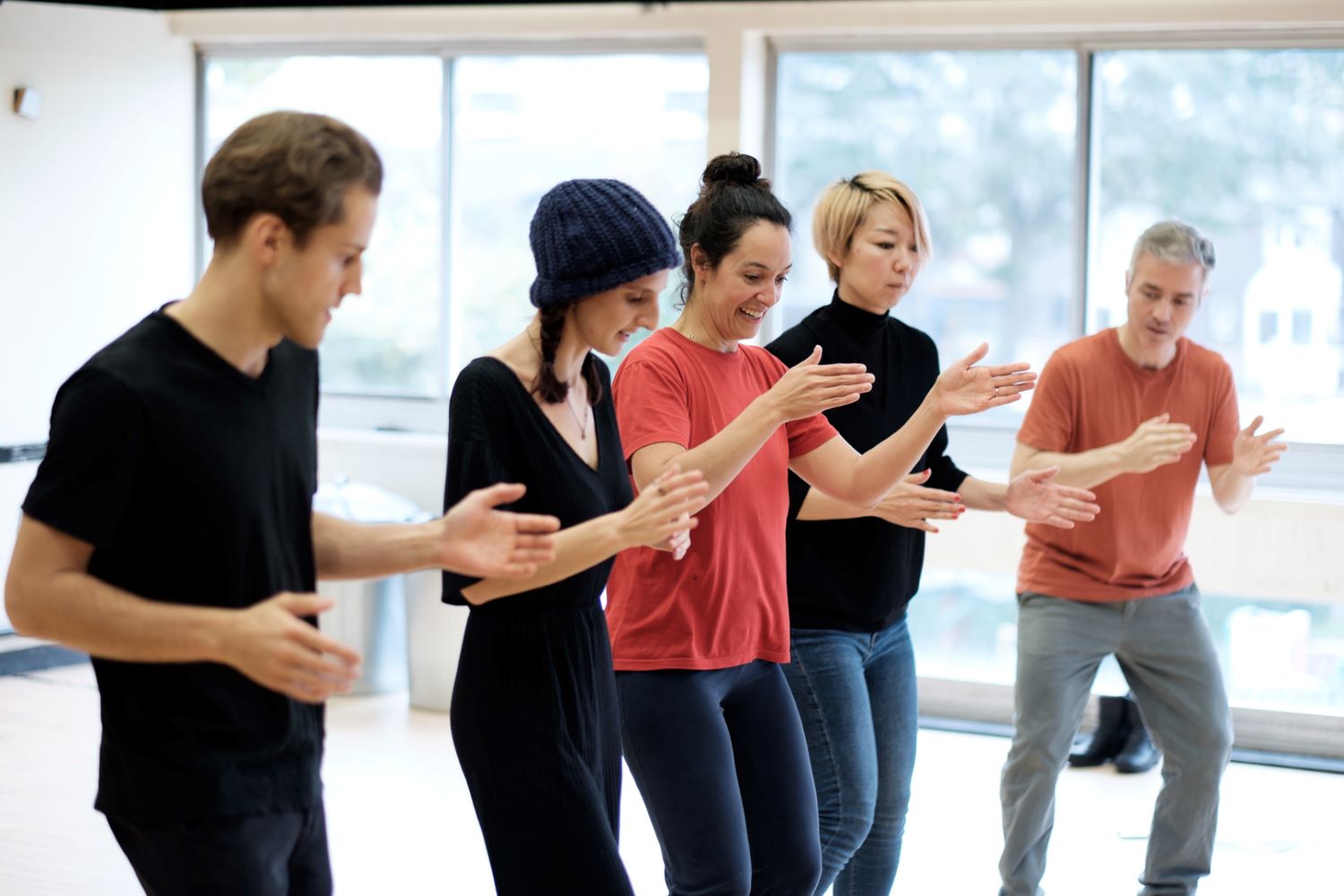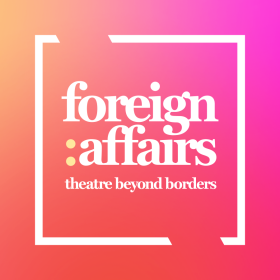The Micro Theatre Company with an Adventurous Spirit
Foreign Affairs’ Camila França and Trine Garrett on fostering dialogue across cultures through theatre in translation
by Alex Fleming
Founded in 2010, London-based theatre company Foreign Affairs brings theatre from around the world into unconventional spaces, with a focus on theatre in translation, cross-cultural exchange, training and collaboration. Passionate about sharing pieces that shift perspectives, the company is also committed to sharing its knowledge and experience, offering a range of community-building workshops and mentorships that provide insight into the UK’s theatre industry while championing exciting international works.
In this interview with SBR, Foreign Affairs’ co-founders and artistic directors, Camila França and Trine Garrett, discuss how translation came to play an integral role in their work, the differences between translating for the page and translating for the stage, and how this experience has shaped their practice as theatre-makers.

SBR: Foreign Affairs works across three broad areas: theatre productions; translator training and events; and theatre-making workshops for a range of age groups. Could you tell us a little bit about how these strands came together, and how they complement one another?
Trine: Absolutely! The strands of our work – theatre, translation, and training – evolved quite naturally over time. Camila and I met during an acting course in 2008, and despite both of us calling London home, we often felt like outsiders in the industry, limited to roles that didn’t quite reflect our ambitions. This sense of wanting more sparked the idea behind Foreign Affairs.
We started the company with not much more than a shared passion for theatre and support from friends. We knew very little about the UK industry or the ins and outs of producing. In those early years, much of our work was about learning and growing as theatre-makers ourselves, which often meant navigating some pretty challenging situations – for example, our first venue had no electricity or running water. It was all part of the adventure, and, as cheesy as it sounds, we learned to turn every obstacle into an opportunity for growth. This experience underscores our emphasis on training and continued development.
Camila: Collaboration has always been at the heart of our work. From the start, we knew we wanted to work across languages and cultures, though we weren’t sure how that would shape the company. Soon, it became clear that our mission wasn’t just about making theatre: it was about fostering dialogue across cultures.
We built a community of performers and makers, experimenting with techniques and honing our craft, which naturally led to the training and workshops we offer today. London’s multicultural landscape deeply influenced our ensemble and approach to translation. Our focus on translation almost happened by chance (Trine: a chance encounter with a Danish contract killer!), but today it’s a core part of what we do. Our productions, translation, and training programmes all support one another in a deeply connected way.
Trine: Our productions are driven by the work of our creative community – performers, theatre-makers, and translators. Our engagement and training programmes allow us to share the creative process, deepening the communal and collaborative nature of our work. It’s all interconnected – and closely tied to our journey as artists and as a company.
Soon, it became clear that our mission wasn’t just about making theatre: it was about fostering dialogue across cultures.
SBR: As theatre makers, what do you feel are the biggest differences between translating for the page and for the stage? How do your Theatre Translator Mentorships encourage translators to look at their craft in a new light?
Trine: The main difference is that when you’re translating for the stage, it’s not just something to be read – it’s something to be embodied by actors and realised by an entire team of creatives (directors, designers, technical teams, etc.). The text must operate in a three-dimensional space, with people breathing life into it, which requires a different awareness.
In our mentorship programme, we really encourage participants to think about that shift – to consider how the text will be embodied. We also emphasise the importance of understanding both how a text was experienced in its original context and how it will be experienced in its new context. We focus on how the text will (and did) interact with the perspectives of directors, actors, and ultimately audience members.
Camila: Translating for the stage should never be a solitary endeavour – translators are integral to the creative team and therefore shouldn’t be ‘locked away in a room’. Theatre is a collaborative art form, so we make sure that translators are part of the entire creative process.
Our mentorship programme emphasises this collaborative approach by giving participants the chance to engage directly with actors, directors, and other creatives. This interaction helps them understand how their work fits into the larger creative process.
Trine: I also think what’s particularly powerful about our programme is the group mentoring element. Translators can learn so much from one another’s processes, and that peer-to-peer learning is invaluable.
Translating for the stage should never be a solitary endeavour... Theatre is a collaborative art form, so we make sure that translators are part of the entire creative process.
SBR: Translation lies at the heart of your work, though it often seems to get overlooked by other UK theatre companies. What do you consider ‘best practice’ when working with theatre in translation?
Camila: Each piece has its own set of best practices, as every story is unique. In our multicultural world, translated plays are crucial for fostering cultural awareness and exchange, which is essential for empathy and understanding.
Best practice includes giving translators full recognition as part of the creative team. This means including their names in all promotional materials and acknowledging the original language, playwright, and title of the play. I’d love to see more translated theatre featured in mainstream programming, alongside greater support for the smaller companies championing this work.
Trine: You’re right – theatre in translation is often overlooked in mainstream UK theatre, though companies like ours are working to change that.
I think best practice means involving the right people from the start, ensuring proper cultural and linguistic representation. Many of our productions are culturally complex, extending beyond a simple translation journey. For instance, our production of The Wetsuitman by Freek Mariën, translated by David McKay, exemplifies this – a play that takes us on a journey from Norway, down through Europe to the Netherlands and France, and ultimately to Syria. We also invite audiences and our creative community to participate in readings and workshops to gauge how a play resonates. The translator plays a crucial role in this process, collaborating closely with the entire team.
We focus on embracing the cultural context of the plays we work on. Rather than trying to ‘localise’ the text for a UK audience, we celebrate the cultural encounter, creating a space for dialogue between different perspectives rather than smoothing them out.

SBR: Do you think the insight that you have gained into translation through the Theatre Translator Mentorships has affected how you approach plays in translation as actors/directors/producers?
Trine: Oh, absolutely! Translation wasn't part of Foreign Affairs' original plan – we quite literally stumbled into it (we found a play on the streets of Copenhagen about the aforementioned contract killer!) and fell in love. In many ways, our journey as theatre-makers has been deeply shaped by our relationship with translation.
As artists working in our second language (I’m from Denmark, and Camila is from Brazil and Portugal), we’ve always had a heightened awareness of language and cross-cultural work. That awareness has only deepened as we’ve explored translation further. It’s influenced everything – from how we approach a text to how we collaborate with our teams. Translation and theatre-making have become completely inseparable for us.
Camila: The insight gained through the Theatre Translator Mentorships has been profoundly transformative, both personally and professionally. On a personal level, exploring international work in multicultural contexts, from scripts to teams, has challenged any preconceived notions I had, broadened my perspective, and made me a more compassionate person.
Professionally, it has enriched how we approach our work, especially in navigating cultural nuances and the human experiences embedded in these plays. It’s heightened our sensitivity to the complexities within the text and the need for care in handling those layers on a daily basis. I’m extremely grateful to everyone we’ve met through the mentorship programmes over the years. Their passion and generosity in sharing their knowledge have taught us so much and continue to inform our practice.
We focus on embracing the cultural context of the plays we work on. Rather than trying to ‘localise’ the text for a UK audience, we celebrate the cultural encounter, creating a space for dialogue between different perspectives.
SBR: What advice would you give to aspiring translators of drama (craft-related or otherwise!)? What can translators do to help foster a more diverse theatre offering?
Camila: My biggest piece of advice is to actively seek out and champion underrepresented voices and stories from the languages you translate. These stories are out there, and bringing them to light is crucial for fostering a more diverse theatre scene. It’s about finding those hidden gems and making sure they get the attention they deserve.
Trine: For aspiring theatre translators, I’d recommend connecting with the vibrant community of theatre translation. There are fantastic groups and companies beyond Foreign Affairs that offer great opportunities to develop your craft and gain valuable insights. Engaging with this network can open up new avenues for learning and collaboration.
Camila: Exactly! Organisations like Out of the Wings and CambioScena are excellent examples. Building relationships within these networks is invaluable. Also, subscribe to newsletters from theatres that feature work in translation to stay informed and engaged. And, of course, support the community by watching and promoting theatre in translation!
Trine: Supporting work in translation is crucial. Look beyond the mainstream to the off-West End and fringe venues, where exciting translated works are often produced. Don’t hesitate to start conversations with theatres or companies about plays you’re passionate about. It can be challenging, but persistence really pays off.
By introducing new voices, staying connected with the community, and pushing boundaries, you’re helping to shape a more diverse and inclusive theatre landscape. We need those voices now more than ever.

SBR: What is your view on the general state of theatre in the UK today? What do you feel have been the biggest positive/negative developments in recent years?
Trine: Phew, where to begin? Theatre in the UK is incredibly vibrant and dynamic, which is one of the reasons I made London my home. Outside the mainstream, there’s exciting work being created by voices often absent from the bigger West End stages, and that’s a definite positive.
However, the funding landscape has become increasingly precarious for smaller, independent companies. The cost of living crisis and rising West End ticket prices also contribute to a sense that theatre is becoming more exclusive, accessible only to those who can afford it. This issue has always been a concern, but it feels especially pressing now. Theatre should be for everyone.
Camila: Despite these challenges, many smaller and grassroots organisations, such as Legal Aliens, Global Voices Theatre, Exchange Theatre, New Earth Theatre, and Projekt Europa among others, are determined to support and champion international work. Their dedication is crucial for ensuring representation and diversity in the UK theatre industry.
SBR: Finally, what do you look for in a work of drama? What’s next in the Foreign Affairs pipeline?
Trine: Although we don’t always agree (despite over fifteen years of working together), we’re both drawn to work that truly moves us – emotionally, intellectually, or even physically. We look for pieces that shift our perspective and make us see the world in a new light. It doesn’t have to be grand or epic; it can be something small and intimate, but it has to resonate with us as artists and people.
Camila: As for what’s next for Foreign Affairs, we’re deeply immersed in this year’s Theatre Translator Mentorship, supported by the Jerwood Foundation, which features a Swedish play (Ambulance by Paula Stenström Öhman, translated by Rebecca Hagberg Snäckerström). We’re also preparing for our January Translation Showcase at Jermyn Street Theatre. Our workshops with young and emerging theatre-makers in East London continue, which is always a highlight. On the production side, we’re taking a bit of a breather after three intense years of back-to-back shows, but we’ve got exciting ideas in the pipeline—of course, involving translation!

Camila França and Trine Garrett
Camila França (she/her) is Co-Artistic Director of Foreign Affairs. Originally from Brazil, Camila trained as an actor but her passion for bringing untold stories from afar to local audiences has led to her co-producing and directing many of the company’s artistic and creative programmes. Camila leads the company’s outreach programmes and is passionate about working with local communities.
Trine Garrett (she/her) is Co-Artistic Director of Foreign Affairs. As an experienced teacher and workshop facilitator, Trine leads the company’s creative learning programmes and she runs masterclasses and workshops rooted in the company’s practice for other companies and organisations, most recently for the Royal Court Theatre, Cut the Cord theatre and BCLT: British Centre for Literary Translation.
